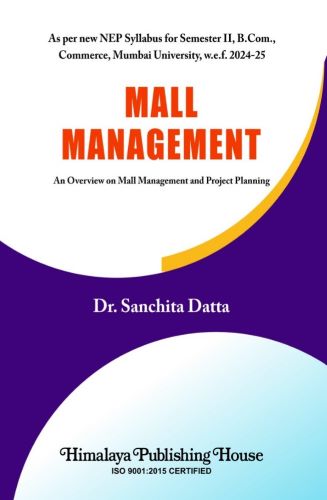The retail landscape has undergone a significant transformation in recent decades, with shopping malls emerging as vibrant hubs of commerce, entertainment, and social interaction. As the retail industry continues to evolve, understanding the intricacies of mall management has become essential for professionals, entrepreneurs, and students.
This comprehensive book provides an in-depth exploration of the concept of malls, their architecture, and the complexities of managing these dynamic destinations. Divided into two modules, this book offers a structured approach to mastering the art of mall management.
Module I delves into the fundamentals of mall development, tracing the genesis of malls globally and their growth in India. It also examines the advantages of malls over other retail formats and compares the mall landscape in the USA and India. A detailed analysis of mall architecture and its components provides valuable insights into creating functional and appealing spaces.
Module II focuses on the practical aspects of handling a mall project, covering critical aspects such as location selection, tenant mix planning, lease management, marketing, and facilities management. Expert commentary on retail formats, anchor tenants, and event management provides actionable guidance for mall professionals.
Through case studies, lectures, assignments, and interactive pedagogical approaches, this book aims to:
- Equip students and professionals with a thorough understanding of mall management principles.
- Foster critical thinking and problem solving skills in mall operations.
Contents –
1. Introduction to Mall Management
– Definition and Types of Malls
– Types of Malls
– Genesis of Malls: Origins and Evolution
– Growth of Malls Globally
– Definition and Types of Malls
– Diffusion of the Mall Concept to India
– Growth of Malls in India
– Future Trends and Projections of Malls in India
– Advantages of Malls Over Other Retail Formats
– Comparison of Malls in the USA and India
– Mall Architecture
– Components of Mall Architecture
– Significance of Key Components of Mall Architecture: Facade, Atrium, Parking, Circulation Path, and Utilities
2. Mall Project Management
– Choosing the Macro and Micro Locations
– Concept and Tenant Mix Planning
– Concept Planning and Retail Zoning
– The Relationship Between Concept Planning and Retail Zoning
– Lease Management
– Marketing and Space Selling in Mall Management
– Facilities and Utilities Management
– The Importance of Facilities & Utilities Management in a Mall
– Security and Information Systems in a Mall
– Mall Promotion and Event Management
– Importance of Mall Promotion and Event Management
Reference and Suggested Readings






